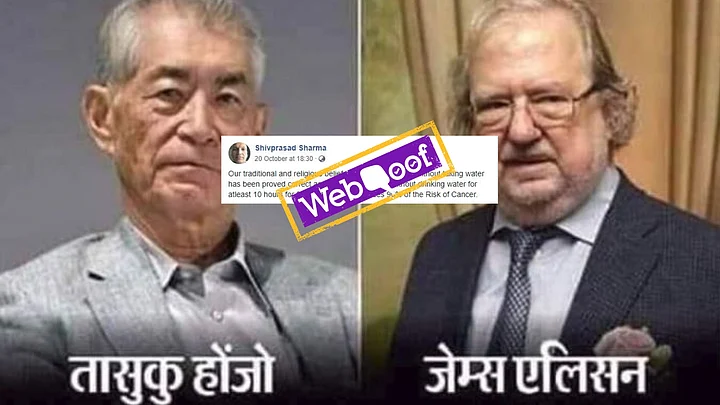Social media is filled with posts claiming that if one fasts on the 11th lunar day, known as the Ekadashi according to the Hindu calendar, their chances of having cancer reduces by 90 percent.
Not just this, viral posts further claim that the discovery of this “truth” by two researchers won them the Nobel Prize in Medicine in 2018.
WHAT DOES THIS POST SAY?
The post claims that if a person can go without eating and drinking for 10 hours on 20 days in a year, their chances of having cancer is reduced by 90 percent. It claims that when a body is hungry, it starts killing cancerous cells.
Moreover, the post claims that US researcher James Allison and Japanese researcher Tasuku Honjo have won the 2018 Nobel for this “discovery.”
Here is another post with the same story.
WHAT IS THE TRUTH?
- The two men identified in the story are indeed US researcher James Allison and Japanese researcher Tasuku Honjo.
- They have won the 2018 Nobel Prize for Physiology or Medicine.
- Importantly, they have not won the prize for “discovering” that fasting on Ekadashi will prevent chances of having cancer by 90 percent.
WHY WERE THEY AWARDED THE NOBEL PRIZE?
The two scientists have won the top honour for their ground-breaking work in manipulating the immune system to combat cancer and pioneering immunotherapy. More specifically, the drugs they discovered, called check-point inhibitors, remove the breaks cancer cells apply on the immune system. Once released, the body’s immune system is able to attack the cancer cells and destroy them.
Here’s a video explainer on what immunotherapy is.
A SIMILAR CLAIM, TWO YEARS AGO
A similar claim was made by social media posts – with Japanese cell biologist Dr Yoshinori Ohsumi.
The posts claimed that Dr Ohsumi too won the top honor for his “discovery” about how Ekadashi fasting will prevent cancer.
In reality, he was awarded the Nobel prize in medicine in 2016, for discoveries on how cells break down and recycle their own components.
